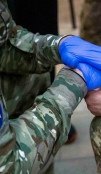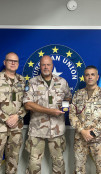25th anniversary of the entry into force of the Convention on the Prohibition of the Development, Production, Stockpiling and Use of Chemical Weapons (CWC)

“The use of chemical weapons by anyone, anywhere, at any time and under any circumstances constitutes a violation of international law and can amount to the most serious crimes of international concern – war crimes and crimes against humanity. […] Any use of chemical weapons is an affront to international law on which we all depend for our security and wellbeing”, reads the Declaration by the High Representative on behalf of the EU on this occasion.
WHAT ARE CHEMICAL WEAPONS?
A Chemical Weapon is a chemical used to cause intentional death or harm through its toxic properties. Munitions, devices and other equipment specifically designed to weaponise toxic chemicals also fall under the definition of chemical weapons.
Under the Chemical Weapons Convention, the definition of a chemical weapon includes all toxic chemicals and their precursors, except when used for purposes permitted by the Convention – in quantities consistent with such a purpose. The full and legal definition of a Chemical Weapon can be found in Article II of the Convention.
Types of chemical agents
The main types of prohibited chemical agents are Choking agents (e.g. Chlorine), Blister agents (e.g. sulphur mustard), Blood agents (e.g. Hydrogen cyanide) and Nerve agents (e.g. Sarin). Riot control agents, such as tear gas, can legitimately be used for domestic law enforcement purposes. However, under the Convention, they are considered chemical weapons if used as a method of warfare.
CHEMICAL WEAPONS CONVENTION (CWC)
Convention on the Prohibition of the Development, Production, Stockpiling and Use of Chemical Weapons and on Their Destruction, or more commonly known as the Chemical Weapons Convention (CWC), entered into force on 29 April 1997. It is a key part of the international disarmament and non-proliferation architecture adopted to eliminate chemical weapons and prevent their re-emergence. States Parties to the Convention must ensure that all toxic chemicals and their precursors are only used for purposes that are not prohibited by the Convention, and translate the obligations in the Convention into their national laws and regulations. Today the CWC has 193 States as members. Today, 99% of the world’s declared chemical weapons stocks have been verifiably destroyed.
Key activities and provisions under the Convention:
• Prohibition of production and use of chemical weapons
• Destruction (or monitored conversion to other functions) of chemical weapons production facilities
• Destruction of all chemical weapons
• Consultations, Cooperation and Fact-Finding to verify alleged chemical weapons use (inspections of Alleged Use - IAU, Challenge Inspections - CI, Technical Assistance Missions - TAV).
• Industry inspection regime for the production of chemicals which might be converted to chemical weapons
• Fostering peaceful and secure uses of chemistry to contribute to the economic and technological development of States Parties
• National capacity-building and preparedness to respond to cases of use of chemical weapons
• Attribution of responsibilities for the use of chemical weapons in the Syrian Arab Republic (since 2018, Decision by the Fourth Special Session of the Conference of States Parties to the CWC).
Treaty controlled substances
The Convention defines three categories of controlled chemical substances that can either be used as chemical weapons themselves, or used to manufacture chemical weapons (“precursors”):
• Schedule 1: chemicals that have few, or no use outside of chemical weapons. These may be produced or used for research, medical, pharmaceutical or chemical weapons testing purposes but sites producing more than 100 g per year must be declared.
• Schedule 2: chemicals that have legitimate small-scale application. Manufacture must be declared.
• Schedule 3: Chemicals that have large-scale uses apart from chemical weapons. Production plants which manufacture more than 30 tons per year must be declared and can be inspected.
ORGANISATION FOR THE PROHIBITION OF CHEMICAL WEAPONS (OPCW)
Organisation for the Prohibition of Chemical Weapons is the implementing body of the Chemical Weapons Convention. Its HQ and laboratory are based in The Hague, The Netherlands. The 2013 Nobel Prize for Peace was awarded to the OPCW on 10 December 2013 for its extensive efforts to eliminate chemical weapons.
THE EUROPEAN UNION SUPPORT TO THE IMPLEMENTATION OF THE CHEMICAL WEAPONS CONVENTION
In line with EU strategy against proliferation of weapons of mass destruction, the European Union has since 2004 provided over EUR 38 million in voluntary funding in support of OPCW activities. This support has included inter alia:
• Capacity-building and awareness-raising
• Universalisation of the Chemical Weapons Convention
• Destruction of the chemical weapons stock declared by the Syrian Arab Republic
• Establishment of the new OPCW laboratory (“ChemTech Centre”)
• Provision of satellite imagery and imagery analysis in support of OPCW missions
• Enhancing the OPCW Cyber Security, Resilience and Information Protection
The European Union is strongly engaged in enhancing the international taboo against the use of chemical weapons, and supports the fight against impunity for the use of chemical weapons both politically and financially. As a member of the International Partnership Against Impunity for the Use of Chemical Weapons (PAI), the EU continues to support collective efforts to ensure accountability for perpetrators of chemicals attacks.
THE EUROPEAN UNION SUPPORT TO STREGTHENING OF CHEMICAL SAFETY AND SECURITY GLOBALLY
EU CBRN Centres of Excellence Initiative is an external civilian security programme focusing on the mitigation of risks and threats related to chemical, biological, radiological and nuclear material, stemming from accidental, natural or criminal sources. Established in 2010, the initiative currently includes 62 partner countries grouped into eight Regions. Since 2010, 25 projects (out of a total of 82) have focused specifically on addressing biological risks, while other projects have integrated biological risks as part of a CBRN all-hazard approach.
Additionally, the EU has supported Ukraine in its efforts to strengthen chemical safety and security in line with Ukraine’s obligations under the CWC and the implementation of UNSCR 1540 (2004). This support has been channelled in 2017-2021 through Council Decision (CFSP) (CFSP) 2017/1252 in support of the strengthening of chemical safety and security that was implemented by the OSCE and provided a budget of €1.4 million for:
• improving Ukraine’s relevant legislative and regulatory framework;
• establishing a Ukrainian national reference centre to identify controlled and toxic chemicals; and
• strengthening controls over cross-boundary movement of controlled and toxic chemicals.
The Science and Technology Centre in Ukraine (STCU) is a key partner in the implementation of EU’s CBRN risk mitigation policy in the South East and Eastern Europe region.
Furthermore, the EU also currently provides EUR 1.4 million in support of the UN Secretary-General’s Mechanism for the investigation of alleged use of chemical and biological weapons.
DISINFORMATION ABOUT CHEMICAL WEAPONS
Russia has a track record of promoting unsubstantiated and false claims regarding alleged development and use of non-conventional weapons by others. Russian allegations have been proven false and refuted by independent media, international experts and fact-checkers over and over again.
Since December 2021, Russia has alleged that Ukraine is preparing provocations with chemicals as weapons. However, it has not seized the OPCW Executive Council, which is charged with overseeing the implementation of Chemical Weapons Convention, to substantiate its claims.
Instead, Russia has chosen to send the CWC States Parties diplomatic notes with several diversionary scenarios of possible provocations allegedly under preparation. In this context, it is to be recalled that Russia itself has used chemical weapons, notably in the attempted murders of former KGB agent Sergey Skripal (2018) and opposition leader Alexey Navalny (2020).
The EU has contributed to efforts to counter Russian disinformation in the OPCW context:





